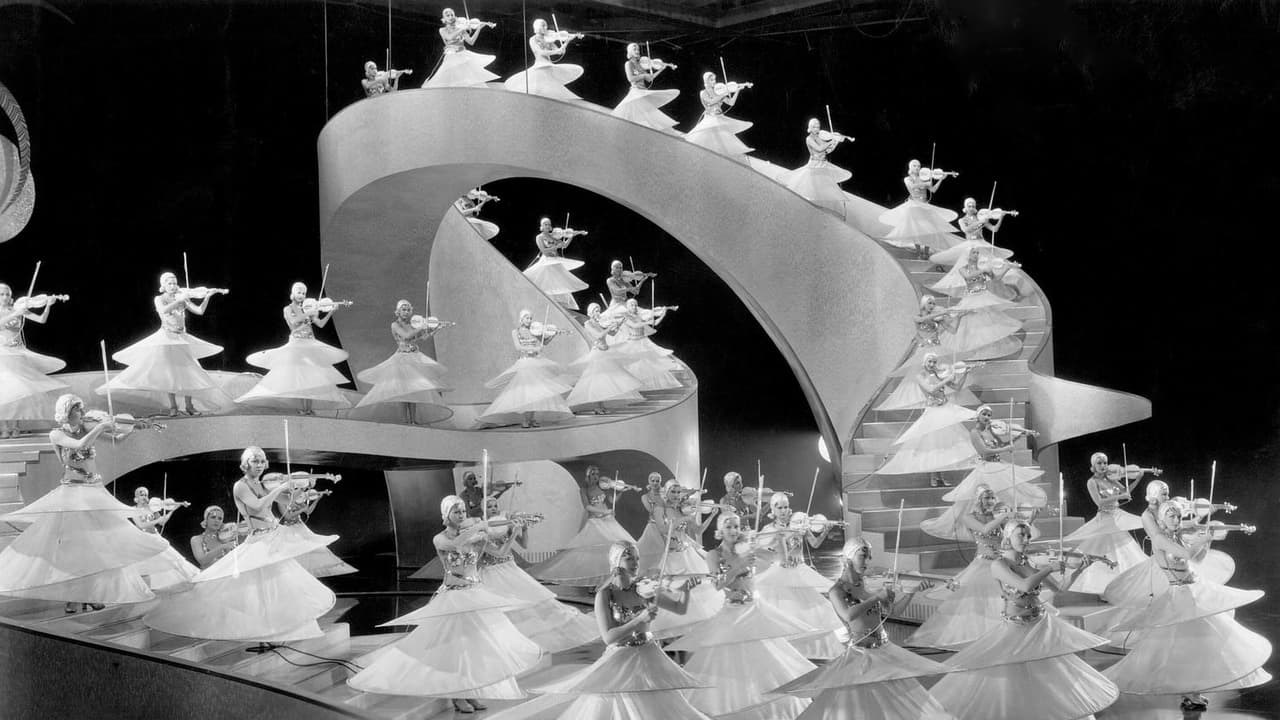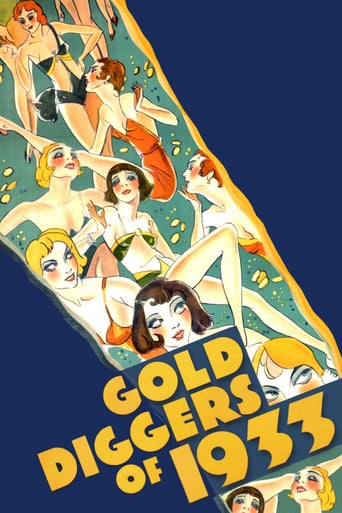

Excellent, smart action film.
... View MoreThe acting in this movie is really good.
... View MoreI enjoyed watching this film and would recommend other to give it a try , (as I am) but this movie, although enjoyable to watch due to the better than average acting fails to add anything new to its storyline that is all too familiar to these types of movies.
... View MoreExcellent and certainly provocative... If nothing else, the film is a real conversation starter.
... View MoreWhen I'm in the right mood I think of THE GOLD DIGGERS OF 1933 as the best musical ever made. Mostly I find its tonal shifts a bit incoherent for that high honor, but GOLD DIGGERS is at least a strong contender.For my money, a great musical ought to have a great original musical score (sorry SINGING IN THE RAIN) and beyond that ought to be of real interest even in the absence of its music. I don't mean that we're looking for Hamlet or King Lear, such complexity would probably make successful musical integration impossible, but a clever treatment of a solid subject will do. GOLD DIGGERS presents us with a sharp comedy of errors book-ended by a pair of serious production numbers. Probably a unique structure and not entirely successful, but the parts of this structure rarely descend below the marvelous.Maybe only 'We're In The Money' (really titled 'The Gold Digger's Song') can stand alone from the film's score, but Warren and Dubin's other efforts all work perfectly within Berkeley's inspired production numbers. Those numbers are a slight advance on 42nd STREET's, more consistently elaborate and spread out within the picture, which was probably a good idea. The opening number, springing immediately from the opening credits, seems as merry and frivolous as they come until its conclusion is cut off by a sheriff's repossession, giving us a textbook example for the word 'ironic'. There remain serious undertones through the nice expository scenes in the girls' apartment which follow, but the movie soon shifts to pure comedy, and the musical numbers along with it (especially the deliriously surreal 'Pettin' in the Park'). Once the comical confusions have been cleared up the ultimate 'Forgotten Man' number comes nearly out of nowhere (Ned Sparks had given us slight anticipation for it much earlier on). Its relevance to recent events in 1933 is clear (WW I vets had been promised bonuses for their old age. Given the economic circumstances, they had demanded the bonuses immediately and marched on Washington in protest, camping out there for quite some time. Eventually the government ordered the military, under Douglas MacArthur as it happened, to clear them out, and this was done violently. It shook a lot of people up, referenced here by Joan Blondell's memorable glare towards the cop telling the homeless veteran to move on, but it doesn't seem to have much to do with the movie we've just seen so far as I could tell).The Forgotten Man number is brilliant, however, and so had been the movie that we had just watched. Aline MacMahon and Guy Kibbee are particularly funny, Warren William does well in the thankless role of the straight man to everybody's jokes, Ginger Rogers gives further proof of her versatility as she projects pure vanity perfectly. It's unfortunate that she nearly disappears from the movie early on (and for that matter, Keeler practically disappears from it once the Willam/Kibbee-Blondell/MacMahon plot takes center stage). Ginger actually filmed a very bluesy/sad version of 'I've Got To Sing A Torch Song' which must have been meant for sometime around the scene when Trixie threw Fay out of that nightclub for coming on to 'Fanny'. The film seems to have disappeared though for those interested the sound track can be heard on Youtube. It would have given a twist to the character of Fay, a one-noter as she now exists.THE GOLD DIGGERS OF 1933 may not be the best of all possible musicals, but if someone were to ask me for the most representative film from Hollywood in the 1930s, GOLD DIGGERS would be the one.
... View MoreWhile "42nd Street" gets most of the acclaim today I think that "Gold Diggers of 1933" may be the best all-around effort among the Busby Berkeley musicals. The story concerns a Boston blue blood songwriter who finances a Broadway show and ends up taking the stage at the last minute. However, when his brother hears about his undignified behaviour he comes to town in order to put an end to his newfound career & romance.The cast is a fine one which produces several entertaining performances. A number of the actors are "42nd Street" alumni, including Ruby Keeler, Dick Powell, Guy Kibbee, Ned Sparks & Ginger Rogers. Warren William, Joan Blondell & Aline MacMahon join them to make up an enviable cast.Mervyn LeRoy was in the director's chair and he did a pretty good job but the obvious attraction here is Busby Berkeley's peerless musical numbers featuring the music of Warren & Dubin. From the opening number "We're in the Money" to the visual splendour of "Pettin' in the Park" & "The Shadow Waltz" it's clear that we're seeing and hearing something special. However, I question the use of "Remember My Forgotten Man" as the closer since I consider it the weakest and least 'fun' of the numbers.Minor complaints aside, "Gold Diggers of 1933" is an entertaining musical containing some stellar work from Busby Berkeley along with catchy songs from Warren & Dubin. Unlike some of the other Berkeley musicals the story here is more than just an excuse to show some musical numbers, which I think elevates it above the pack.
... View MoreIn Hollywood's most successful collaborative era, sometimes the best things happened by accident. Gold Diggers of 1933 was set to be a routine backstage romantic comedy, but after the runaway success of 42nd street with its spectacular dance numbers choreographed by Busby Berkely, studio heads decided to make a few changes and shoehorn in some Berkely routines. What should have been a mess, turned out to be a masterpiece. You see, it happened by accident, but not without overwhelming creative genius from all corners.First of all let's disregard Berkely for a moment and consider the bones of the picture. This was a golden age for Warner Brothers, and even their potboilers tended to be meaty offerings. The broad plot may be a simple comedy of errors, but the minutiae and the dialogue are unashamedly frank about the depression, then at its very worst point. The fact that the comic escapades are backed by very real and harsh truths gives an unexpected layer of poignancy to the proceedings. Yes, the man-baiting escapades of three money-hungry chorus girls makes for riotous entertainment, but we are never allowed to forget how they became money-hungry.The director is Mervyn LeRoy, who despite his youth was one of the most competent and professional filmmakers on the Warners payroll. He directs Gold Diggers with pace and punch, never allowing the action to slow down and become dull, but still keeping everything in clarity. A neat little trick of his is using depth to keep certain characters on display. For example, in the scene where Don Gordon (the perpetual juvenile lead) is doubled up with lumbago, Gordon and Ned Sparks are in the foreground, but Dick Powell is prominently placed in the background. Gordon is the most important character at that precise moment, so it is logical to have him up front, but Powell is more important in the long run as he will soon replace Gordon, so it is necessary for us to remember him at that time.The cast is one to die for, or at the very least, go to prison for. Dick Powell and Ruby Keeler are ostensibly the leads, but the show really belongs to Joan Blondell and Aline MacMahon. Powell was a great singer, and Keeler a wonderful dancer, but neither of them could act well. And thankfully, while they are prominent in the song and dance numbers, they are really supporting players in the drama. Blondell was prolific in both musicals and melodramas of this time, but tended to play "best friend" type roles rather than leading ladies. Gold Diggers is her chance to shine, and show what a terrific actress she is. She plays things at a fairly muted level, but there is a lot of emotion going on under the surface. When she appears in the Forgotten Man number she not only becomes a singer, she carries on being an actress. MacMahon at first looks a little out of place amongst all the sweet and delicate chorines, but as soon as she gets to work her magic on Guy Kibbee she dominates the screen and you know exactly why she was cast. A young Ginger Rogers is here too, still getting villainous roles thanks to her mean-looking face, but nevertheless proving herself to be a superb performer. Ned Sparks gives perhaps his deepest and most heartfelt performance, without ever once breaking out of his trademark character. Amid all these sparkling jewels, there are some memorable bit parts by the likes Ferdinand Gottschalk and Sterling Holloway, yet more pearls in the Gold Diggers crown.And at last we come to the music. Of course, the melodies of Harry Warren are simply divine, the lyrics of Al Dubin cheeky and incisive as ever, and the choreography of Busby Berkely absolutely breathtaking, but it's how the whole thing is fitted together that puts Gold Diggers so far ahead of its peers. Most of the Berkely musicals "stacked" the numbers - that is, put them all together at the end as a grand finale. That worked fine for 42nd Street and Footlight Parade, but for Gold Diggers of 1933 the structure is geared to awesome effect. We open with "We're in the Money", a lively slice of irony casually wishing the depression away. "Pettin' in the Park" gives us a little comical boost in the middle of the picture. "Shadow Waltz" is pure Berkely indulgence, lovely to look at but with nothing that will unbalance the end of the picture emotionally. And finally, "Remember My Forgotten Man" drops us right into the realities of the depression. It is a bitter counterpoint to "We're in the Money" and its impact is utterly devastating.Gold Diggers of 1933 is not only the finest of the Busby Berkely musicals, not only the pinnacle of Warner Brothers' pre-code licentiousness, it is the very heart of depression-era America. "Can't you hear that wailing?" Ned Sparks asks us, as Dick Powell hammers out a rough version of "Forgotten Man". You'll hear it alright.
... View MoreWow, what an astounding movie. I don't know when I've enjoyed a movie more than this. Sure, there are lots of movies I would say are greater, more worthwhile, and more moving, but "enjoyable" is not the first adjective that comes to mind when you are watching, say, Shindler's List. Nor should it be. But this one .... a pure delight! From the opening number of "We're in the Money" to the closing "Forgotten Man," I just can't say enough in praise. Oh yes, there's an entertaining, rather risqué plot in the middle too. It almost doesn't matter. Joan Blondel is gorgeous, Ruby Keeler is captivating, and Ginger Rogers is a delight. And Busby Berkeley proves himself to be an unrivaled creative genius. The number with the illuminated violins is amazing. The closing number, "Forgotten Man", is powerful.Not good enough for you yet? How about a group of naked sexy young women illuminated behind a screen? This is truly the musical for people who don't like musicals.henry
... View More